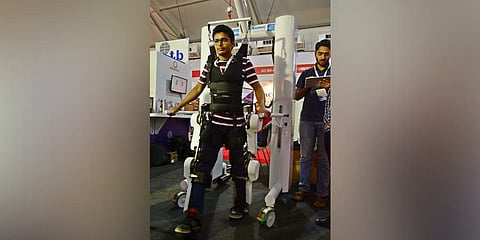

BENGALURU: In intelligent device could soon help those who are paralysed waist down owing to spinal cord injuries, strokes, cerebral palsy, dual leg fractures, hip/knee replacements, obesity, Parkinson’s, limb weakness, etc..
In January, this Robotic Exosketelon Assisted Rehabilitation System (REARS) robot will be commercially launched in some hospitals in the city by Bengaluru-based startup Bionic Yatra.
The proprietary system was launched at the Bengaluru Tech Summit on Wednesday.Girish Mudgal, director of TimeTooth Technologies that is working with Bionic Yatra to make REARS, told TNIE, “There are two robots in this device. The mobile one supports body weight and offloads the pressure on the patient’s feeble legs. The other is the wearable robot which is the exoskeleton. It holds the hip and knee of the person.”
The artificial intelligence and machine learning technology used in the robotics include motors, sensors, intelligent control systems for the robot --- all of which gauge what an individual patient requires.
“Each patient’s condition and power is different and the robot will adjust itself accordingly to allow them to use their strength as well. The prototype was launched in December 2018 and clinical trials are ongoing. We are in talks with big private hospitals in Bengaluru, for doctors and physiotherapists to use it during rehabilitation,” he said.
The Bengaluru-based startup, launched in 2017, is looking to modify the robot to make a lighter and smaller version that can be used by the patient when he or she returns home and for use in public places.
“It will be commercially launched in January 2020 in hospitals. Doctors will prescribe therapies and we will feed the inputs into the software. Doctors will be trained to use this without our help. It costs between Rs 1.5 crore and Rs 2 crore,” he added.